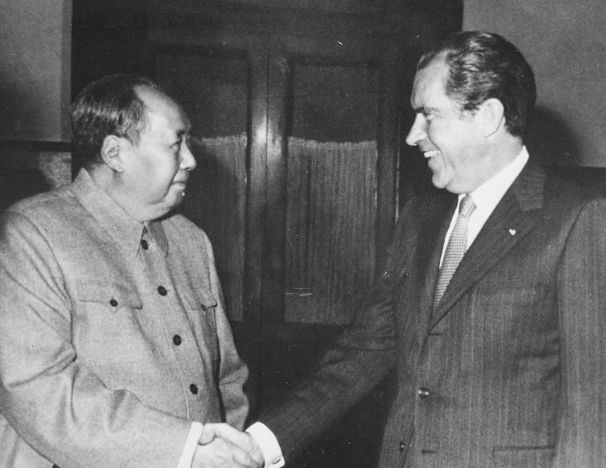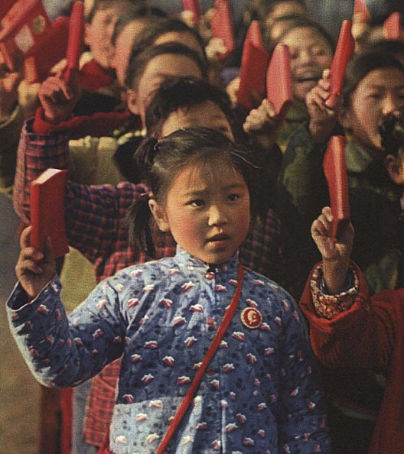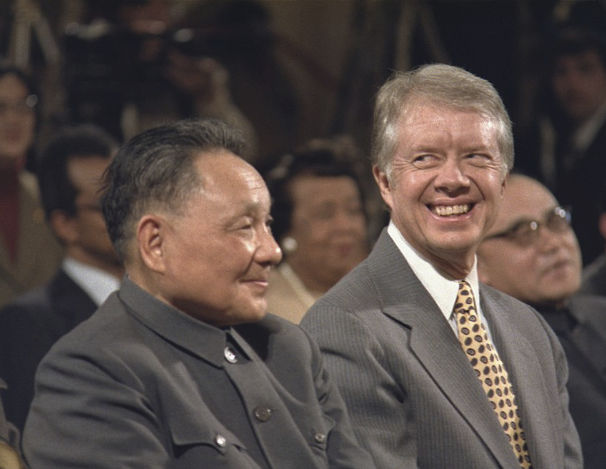After the end of the Japanese occupation of China, Mao Zedong, leader of the Chinese Communist Party, triumphed over the Kuomintang -the Nationalist party. In 1949 he founded the People's Republic of China.

Wikimedia Commons
a) Transition to socialism
During the '50s, the land was expropriated and redistributed among the peasants. Afterwards, the government launched a collectivization program in order to improve agricultural production and productivity through the creation of collective farms. Nevertheless, peasants were allowed to keep small private plots for their particular use. On the other hand, a Stalinist industrialization model was developed, based on heavy industry and State centralized planning (Five Years Plans).
Since the objectives of collectivization and development were not fully fulfilled, Mao opened a period of discussion on the path to follow -the Hundred Flowers. Nevertheless, criticism reached the Communist Party itself, whose leadership and decisions were questioned.
b) The Great Leap Forward
As a reaction, Mao insisted that the right path was Socialism adapted to the Chinese needs. Collectivization of agriculture intensified, and existing cooperatives were transformed into large communes of 30.000 people or more. These communes organized local life beyond its agricultural function. On the other hand, large industrial projects were abandoned, and instead the communes received funds to undertake small industrial initiatives.
The Great Leap Forward was a failure, because its emphasis on collectivization and lack of individual incentives for production. Between 15 and 20 million people died of starvation, and the commune experiment (but not the structure itself) was abandoned. Mao himself was criticized and relegated, although he kept his position as chairman of the Communist party. Reformers such as Deng Xiaoping tried to introduce individual incentives in order to increase agricultural and industrial production.
c) The Cultural Revolution
In 1966 Mao reacted against what he considered a deviation from the original Marxist doctrine. The so-called remnants of capitalism, including customs and old Chinese cultural elements were to be eradicated. The Red Guards, radical followers of Mao, persecuted those accused of capitalist or traditionalist deviations.

Wikimedia Commons
d) Evolution after Mao
After the death of Mao in 1976, a struggle for power started between the conservative Maoist elements (the "Gang of Four") and the followers of a more pragmatic approach, led by Deng Xiaoping. Deng could control successfully the Chinese communist party and begun a modernization program (the Four Modernizations, agriculture, industry, technology and national defence). Old restrictions to private initiatives were eliminated: for example a number of peasants received plots of land outside the collective production system. Prices and production increasingly depended on the free market, and consequently, agricultural production rose. On the other hand, the government opened China to international markets: foreign investments and technology imports were accepted, and many students were encouraged to study abroad.

Wikimedia Commons
Thanks to these opening measures and the creation of the so-called "market socialism", the economic development of China and its per capita income grew enormously, and also the standards of living improved. Nevertheless, the rapid economic growth created a high inflation (in other words, a weakened purchasing power) and corruption. Moreover, the economic reforms were not followed by a political change towards democracy. In 1989 the student protests asking for democracy became a massive movement in Tiananmen Square. The government sent the army against the demonstrators and crushed the movement (including hundreds of dead, arrests and executions).
Nowadays, China remains controlled by the Communist Party, since no political opposition is tolerated. In spite of certain new measures, the government has underlined the political monopoly of the Communist party and the "scientific view of development", to solve the existing socio-economic problems. The Chinese economic growth is still very high, on the basis of a cheap labour force and an increasing interest on exports (China joined the World Trade Organization in 2001). Nevertheless, economic unbalances remain between the more modernized urban areas at the coast and the poorer rural zones in the west.
